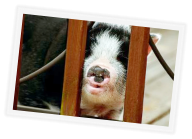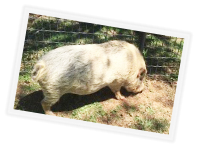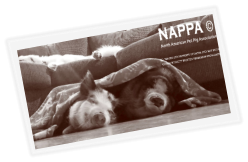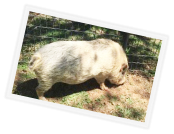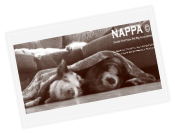BACK TO TOP
FOR MORE INFORMATION, E-MAIL: nappapignews@yahoo.com
2022-2025 Designed by: WimberlysWebWorks.com
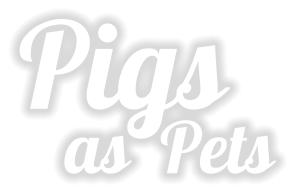
Education
Additional Articles to be added, please keep checking back
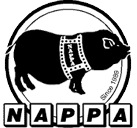


Definition of the Potbellied Pig
“Sus scrofa domesticus” refers to the domesticated subspecies of pigs commonly known as potbellied pigs.
These pigs are a smaller breed compared to their wild counterparts and are specifically bred and raised as
companion animals. They are characterized by their compact size, rounded bellies, and distinctively shaped
snouts. While they share a scientific classification with wild boars (Sus scrofa), potbellied pigs have been
selectively bred over generations to exhibit certain desirable traits for domestication, such as docility,
smaller size, and adaptability to living alongside humans. As such, potbellied pigs are a domesticated variety
of Sus scrofa that have been primarily kept as pets rather than raised for agricultural or commercial
purposes.
Message to Potbellied Pig /Miniature Pig Owners
Dear Potbellied Pig/ Miniature Pig Owners,
We hope this message finds you and your beloved potbellied pig/miniature pigs in good health and
happiness. As advocates for responsible pig ownership, we would like to bring an important matter to your
attention regarding the proper deworming of potbellied pig or miniature pigs.
Deworming is a crucial aspect of pig care, as it helps protect their overall well-being and potential health
issues caused by internal parasites. However, it is equally important to strike a balance and ensure that we
do not over-worm our pigs. It’s important to always deworm any incoming pig and established pig(s).
Over-worming, or excessive administration of deworming medications, can have adverse effects on the
health of potbellied pigs and miniature pigs. Some of the risks associated with over-worming include:
1. Medication Toxicity: Overuse of deworming medication can lead to toxic effects on your pig’s liver and
other vital organs, potentially causing serious health complications.
2. Development of Drug Resistance: Frequent deworming without proper guidance can contribute to the
development of drug-resistant parasites. This can make future deworming efforts less effective, leaving your
pig vulnerable to infestations.
To ensure the well-being of your potbellied pig or miniature pig while maintaining effective parasite control,
Dr. Carr and NAPPA recommend these guidelines:
1. Consult with a Veterinarian: Establish a relationship with a knowledgeable veterinarian experienced in
potbellied pig care. They can provide expert advice on deworming schedules tailored to your pig’s specific
needs.
2. Fecal Examinations: Regularly submit fresh fecal samples for examination to assess the presence and
type of parasites. This helps determine if deworming is necessary and which medications are appropriate
for your pet pig.
3. Follow Veterinary Recommendations: Based on the fecal examination results, your veterinarian will
advise you on the appropriate deworming schedule and medications suitable for your pet pig’s specific
parasite load.
4. Maintain Good Hygiene Practices: Implement good husbandry practices, such as keeping living areas
clean, providing fresh water, and providing a balanced diet. These practices contribute to your pig’s overall
health and help minimize the risk of parasite infestation.
Remember, responsible pig ownership entails providing the best care possible for our potbellied pigs and
miniature pigs. By following these guidelines and working closely with your veterinarian, you can ensure that
your pig receives the appropriate level of deworming while minimizing the risks associated with over-
worming.
If you have any questions or concerns regarding deworming practices or any aspect of potbellied pig care or
miniature pig care, please do not hesitate to reach out to Dr. John Carr, or consult with your veterinarian.
Together, we can ensure the well-being and happiness of our potbellied pigs and miniature pigs.
Wishing you and your potbellied pigs and miniature pigs continued health and joy.
Sincerely,
Dr. Carr-swineunit1@yahoo.com
Pam Munici
nappapignews@yahoo.com
President/ board member
North American Pet Pig Association (NAPPA)
Additional Articles to be added, please keep checking back
Miniature Pig Ownership Quiz
How much do you know about owning a miniature pig as a pet?? Take this short quiz and let us know!
PLEASE CLICK HERE
Home-to-Home Network
Introducing the “Home-to-Home Network” – Connecting Potbellied pigs and Miniature Pigs in Need with
Loving Homes!
Are you a potbellied pig owner or a miniature pig owner who, for various reasons, is looking to surrender
your pig? Or are you someone with a big heart and desire to provide a forever home to those intelligent
animals? Look no further than the Home-to-Home Network, our Home–to-Home Network dedicated to
facilitating the adoption of potbellied pigs and miniature pigs.
At Home-to-Home Network, we understand that life circumstances can change, and sometimes it becomes
challenging to continue caring for a potbellied pig or miniature pig. That’s why we’ve created a
compassionate and supportive community where pig owners can connect with potential adopters who are
eager to provide a nurturing environment for these intelligent and charming animals.
Here’s how the Home-to-Home Network works:
1. Surrender Assistance: As a pig owner considering surrendering your potbellied pig or miniature pig, we
recognize that this decision can be difficult. Our network offers guidance and resources to help you
navigate this process with care and compassion. We connect you with experienced individuals familiar with
potbellied pig welfare, who can assist you in finding the best solution for your pig’s future.
2. Adoption Matchup: For those interested in adopting a potbellied pig or miniature pig, our network
provides a platform to connect with owners looking for a loving home for their pigs. We prioritize the well-
being of the pigs and ensure that potential adopters are thoroughly screened to ensure a suitable match.
Our aim is to find a forever home where the pig will be cherished and cared for as a member of the family.
3. Education and Support: The Home-to-Home Network is committed to promoting responsible pig
ownership. We offer educational resources, guidance on pig care, and ongoing support to both pig owners
and adopters. We believe that fostering a community of knowledgeable and caring individuals, we can
improve the lives of potbellied pigs and miniature pigs and promote their well-being.
Join the Home-to-Home Network today and become part of a community dedicated to finding loving
homes for potbellied pigs and miniature pigs in need. Together, we can make a positive difference in the
lives of these remarkable animals!
Note: The Home-to-Home Network is not a physical facility, but rather an online platform connecting pig
owners and adopters.
Emergency Animal Welfare Organizations
Here are some suggestions for creating a support network to ensure the safety of miniature pigs during
crises.
Engage with Local Authorities:
* Reach out to local law enforcement, fire departments, and emergency management agencies to introduce
your rescue/sanctuary and discuss emergency planning.
* Collaborate with them to identify potential risks and develop coordinated response protocols.
* Invite them to tour your rescue so they are familiar with the layout and the needs of the pigs.
Connect with Neighboring Businesses:
* Introduce yourself and your rescue to businesses located near your rescue.
* Establish communication channels to request assistance if needed.
Partner with Animal Welfare Agencies:
* Connect with other miniature pig rescues, animal shelters, and veterinary clinics in your area.
* Discuss ways you can support each other during crises, such as housing displaced miniature pigs.
Mobilize Volunteer Support:
* Recruit and train a dedicated team of volunteers who can assist during emergencies.
* Provide them with clear instructions on emergency protocols, evacuation procedures, and the specific
needs of your pigs.
By building a robust support network with local authorities, neighboring businesses, animal welfare
agencies, volunteers, and the surrounding community, you can enhance the overall safety and resilience of
your miniature pig rescue/sanctuary during times of crises. Collaboration and community engagement are
key to ensuring the pigs' protection.
Here is list of Animal Welfare Agencies in several states:
ARIZONA
AZ Humane Society - is a leading animal welfare organization in the state that operates shelters and
provides services for homeless and abused animals.
AZ Animal Welfare League & SPCA - is a prominent animal rescue and adoption organization that could
potentially offer guidance or support for miniature pig rescues.
Maricopa County Animal Care & Control - As the animal control agency for Maricopa County, they may
have access to emergency resources.
Pima Animal Care Center - Serving Pima County, is another major animal agency welfare agency that could
potentially assist miniature pigs in their jurisdiction.
In addition to these state & county-level agencies, there may also be local welfare nonprofits, community
foundations that could be potential sources of emergency funding for miniature pig rescues during times of
civil unrest.
OREGON
The Oregon Humane Society - is the largest animal welfare organization in the state, operating shelters
and providing services across Oregon. They may have grant programs or be able to connect rescues with
funding sources.
Oregon Dept. of Ag.- Animal Health Division - The Animal Health Division of the Oregon Dept. of Oregon
is responsible for enforcing animal welfare laws and regulations. They could potentially provide information
on emergency funding programs or resources for animal rescues.
Multnomah County Animal Services - As the animal control agency for Multnomah County, which includes
Portland, Multnomah County Animal Services may have access to emergency resources or be able to direct
rescues to relevant funding.
Washington County Animal Services - Serving Washington County, this animal control agency could be
another potential source of guidance or support for miniature pig rescues in their jurisdiction.
Clackamas County Dog Services - The animal control dept. of Clackamas County may also be able to assist
miniature pig rescues or point them toward emergency funding options.
OHIO
Ohio SPCA - The Ohio SPCA is a statewide animal welfare organization that rescues, shelters, and rehomes
abandoned and abused animals across the state. They operate adoption centers and provide veterinary
services to promote the well-being of all animals.
Cleveland Animal Protective League - The Cleveland Animal Protection League has been protecting and
caring for animals in the Cleveland area since 1913. Their full service provides adoption, veterinary, and
other services to the community.
Columbus Humane - Columbus Humane, formerly the Capital Area Humane Society, is the largest animal
welfare organization serving greater Columbus region. They offer adoption, veterinary, and promotes animal
welfare.
We hope this helps and if you need any help with locating your state for additional info on Animal Welfare
Agencies, please let us know.
BACK TO TOP
FOR MORE INFORMATION,
E-MAIL: nappapignews@yahoo.com
2022-2025 Designed by: WimberlysWebWorks.com

Education
Additional Articles to be
added, please keep
checking back


Definition of the Potbellied Pig
“Sus scrofa domesticus” refers to the domesticated
subspecies of pigs commonly known as potbellied
pigs. These pigs are a smaller breed compared to
their wild counterparts and are specifically bred and
raised as companion animals. They are
characterized by their compact size, rounded
bellies, and distinctively shaped snouts. While they
share a scientific classification with wild boars (Sus
scrofa), potbellied pigs have been selectively bred
over generations to exhibit certain desirable traits
for domestication, such as docility, smaller size, and
adaptability to living alongside humans. As such,
potbellied pigs are a domesticated variety of Sus
scrofa that have been primarily kept as pets rather
than raised for agricultural or commercial purposes.
Message to Potbellied Pig /Miniature Pig
Owners
Dear Potbellied Pig/ Miniature Pig Owners,
We hope this message finds you and your beloved
potbellied pig/miniature pigs in good health and
happiness. As advocates for responsible pig
ownership, we would like to bring an important
matter to your attention regarding the proper
deworming of potbellied pig or miniature pigs.
Deworming is a crucial aspect of pig care, as it helps
protect their overall well-being and potential health
issues caused by internal parasites. However, it is
equally important to strike a balance and ensure
that we do not over-worm our pigs. It’s important to
always deworm any incoming pig and established
pig(s).
Over-worming, or excessive administration of
deworming medications, can have adverse effects
on the health of potbellied pigs and miniature pigs.
Some of the risks associated with over-worming
include:
1. Medication Toxicity: Overuse of deworming
medication can lead to toxic effects on your pig’s
liver and other vital organs, potentially causing
serious health complications.
2. Development of Drug Resistance: Frequent
deworming without proper guidance can contribute
to the development of drug-resistant parasites. This
can make future deworming efforts less effective,
leaving your pig vulnerable to infestations.
To ensure the well-being of your potbellied pig or
miniature pig while maintaining effective parasite
control, Dr. Carr and NAPPA recommend these
guidelines:
1. Consult with a Veterinarian: Establish a
relationship with a knowledgeable veterinarian
experienced in potbellied pig care. They can provide
expert advice on deworming schedules tailored to
your pig’s specific needs.
2. Fecal Examinations: Regularly submit fresh fecal
samples for examination to assess the presence and
type of parasites. This helps determine if
deworming is necessary and which medications are
appropriate for your pet pig.
3. Follow Veterinary Recommendations: Based on
the fecal examination results, your veterinarian will
advise you on the appropriate deworming schedule
and medications suitable for your pet pig’s specific
parasite load.
4. Maintain Good Hygiene Practices: Implement
good husbandry practices, such as keeping living
areas clean, providing fresh water, and providing a
balanced diet. These practices contribute to your
pig’s overall health and help minimize the risk of
parasite infestation.
Remember, responsible pig ownership entails
providing the best care possible for our potbellied
pigs and miniature pigs. By following these
guidelines and working closely with your
veterinarian, you can ensure that your pig receives
the appropriate level of deworming while minimizing
the risks associated with over-worming.
If you have any questions or concerns regarding
deworming practices or any aspect of potbellied pig
care or miniature pig care, please do not hesitate to
reach out to Dr. John Carr, or consult with your
veterinarian. Together, we can ensure the well-being
and happiness of our potbellied pigs and miniature
pigs.
Wishing you and your potbellied pigs and miniature
pigs continued health and joy.
Sincerely,
Dr. Carr-swineunit1@yahoo.com
Pam Munici
nappapignews@yahoo.com
President/ board member
North American Pet Pig Association (NAPPA)
Additional Articles to be added, please
keep checking back
Miniature Pig Ownership Quiz
How much do you know about owning a miniature
pig as a pet?? Take this short quiz and let us know!
PLEASE CLICK HERE
Home-to-Home Network
Introducing the “Home-to-Home Network” –
Connecting Potbellied pigs and Miniature Pigs in
Need with Loving Homes!
Are you a potbellied pig owner or a miniature pig
owner who, for various reasons, is looking to
surrender your pig? Or are you someone with a big
heart and desire to provide a forever home to those
intelligent animals? Look no further than the Home-
to-Home Network, our Home–to-Home Network
dedicated to facilitating the adoption of potbellied
pigs and miniature pigs.
At Home-to-Home Network, we understand that
life circumstances can change, and sometimes it
becomes challenging to continue caring for a
potbellied pig or miniature pig. That’s why we’ve
created a compassionate and supportive community
where pig owners can connect with potential
adopters who are eager to provide a nurturing
environment for these intelligent and charming
animals.
Here’s how the Home-to-Home Network works:
1. Surrender Assistance: As a pig owner considering
surrendering your potbellied pig or miniature pig, we
recognize that this decision can be difficult. Our
network offers guidance and resources to help you
navigate this process with care and compassion. We
connect you with experienced individuals familiar
with potbellied pig welfare, who can assist you in
finding the best solution for your pig’s future.
2. Adoption Matchup: For those interested in
adopting a potbellied pig or miniature pig, our
network provides a platform to connect with owners
looking for a loving home for their pigs. We prioritize
the well-being of the pigs and ensure that potential
adopters are thoroughly screened to ensure a
suitable match. Our aim is to find a forever home
where the pig will be cherished and cared for as a
member of the family.
3. Education and Support: The Home-to-Home
Network is committed to promoting responsible pig
ownership. We offer educational resources,
guidance on pig care, and ongoing support to both
pig owners and adopters. We believe that fostering a
community of knowledgeable and caring individuals,
we can improve the lives of potbellied pigs and
miniature pigs and promote their well-being.
Join the Home-to-Home Network today and
become part of a community dedicated to finding
loving homes for potbellied pigs and miniature pigs
in need. Together, we can make a positive difference
in the lives of these remarkable animals!
Note: The Home-to-Home Network is not a
physical facility, but rather an online platform
connecting pig owners and adopters.
Emergency Animal Welfare
Organizations
Here are some suggestions for creating a support
network to ensure the safety of miniature pigs
during crises.
Engage with Local Authorities:
* Reach out to local law enforcement, fire
departments, and emergency management agencies
to introduce your rescue/sanctuary and discuss
emergency planning.
* Collaborate with them to identify potential risks
and develop coordinated response protocols.
* Invite them to tour your rescue so they are familiar
with the layout and the needs of the pigs.
Connect with Neighboring Businesses:
* Introduce yourself and your rescue to businesses
located near your rescue.
* Establish communication channels to request
assistance if needed.
Partner with Animal Welfare Agencies:
* Connect with other miniature pig rescues, animal
shelters, and veterinary clinics in your area.
* Discuss ways you can support each other during
crises, such as housing displaced miniature pigs.
Mobilize Volunteer Support:
* Recruit and train a dedicated team of volunteers
who can assist during emergencies.
* Provide them with clear instructions on emergency
protocols, evacuation procedures, and the specific
needs of your pigs.
By building a robust support network with local
authorities, neighboring businesses, animal welfare
agencies, volunteers, and the surrounding
community, you can enhance the overall safety and
resilience of your miniature pig rescue/sanctuary
during times of crises. Collaboration and community
engagement are key to ensuring the pigs' protection.
Here is list of Animal Welfare Agencies in several
states:
ARIZONA
AZ Humane Society - is a leading animal welfare
organization in the state that operates shelters and
provides services for homeless and abused animals.
AZ Animal Welfare League & SPCA - is a prominent
animal rescue and adoption organization that could
potentially offer guidance or support for miniature
pig rescues.
Maricopa County Animal Care & Control - As the
animal control agency for Maricopa County, they may
have access to emergency resources.
Pima Animal Care Center - Serving Pima County, is
another major animal agency welfare agency that
could potentially assist miniature pigs in their
jurisdiction.
In addition to these state & county-level agencies,
there may also be local welfare nonprofits,
community foundations that could be potential
sources of emergency funding for miniature pig
rescues during times of civil unrest.
OREGON
The Oregon Humane Society - is the largest animal
welfare organization in the state, operating shelters
and providing services across Oregon. They may
have grant programs or be able to connect rescues
with funding sources.
Oregon Dept. of Ag.- Animal Health Division - The
Animal Health Division of the Oregon Dept. of
Oregon is responsible for enforcing animal welfare
laws and regulations. They could potentially provide
information on emergency funding programs or
resources for animal rescues.
Multnomah County Animal Services - As the
animal control agency for Multnomah County, which
includes Portland, Multnomah County Animal
Services may have access to emergency resources or
be able to direct rescues to relevant funding.
Washington County Animal Services - Serving
Washington County, this animal control agency could
be another potential source of guidance or support
for miniature pig rescues in their jurisdiction.
Clackamas County Dog Services - The animal
control dept. of Clackamas County may also be able
to assist miniature pig rescues or point them toward
emergency funding options.
OHIO
Ohio SPCA - The Ohio SPCA is a statewide animal
welfare organization that rescues, shelters, and
rehomes abandoned and abused animals across the
state. They operate adoption centers and provide
veterinary services to promote the well-being of all
animals.
Cleveland Animal Protective League - The
Cleveland Animal Protection League has been
protecting and caring for animals in the Cleveland
area since 1913. Their full service provides adoption,
veterinary, and other services to the community.
Columbus Humane - Columbus Humane, formerly
the Capital Area Humane Society, is the largest
animal welfare organization serving greater
Columbus region. They offer adoption, veterinary,
and promotes animal welfare.
We hope this helps and if you need any help with
locating your state for additional info on Animal
Welfare Agencies, please let us know.
